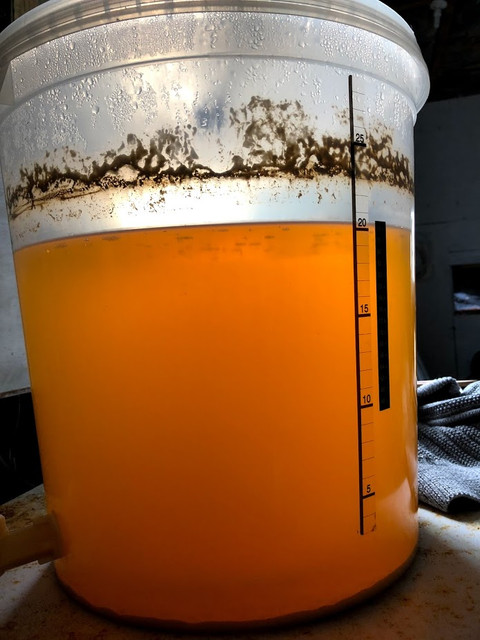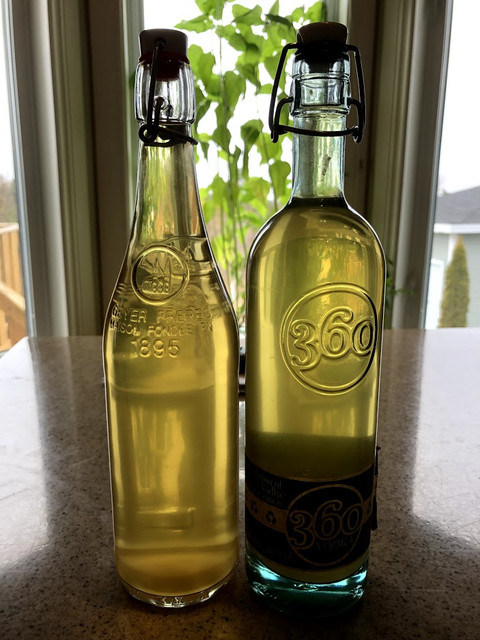GeneDaniels1963
Well-Known Member
Do wee really have to let this stuff age for a few months?
Drink some now, it will be pretty good. But make sure you set some back for 2-4 months. Then it will be outstanding.

Do wee really have to let this stuff age for a few months?
Check this out. I haven’t tried this but I’ve been meaning to. I can’t stand the way artificial sweeteners taste and this is the only method I know of to make a sweet cider that is carbonated without sorbate, backsweetning and force carbonating in a keg. Or without adding something like Splenda to sweeten.
I have however dry hopped a cider before. I don’t remember the amount of hops I used. I do remember it was a gallon of cider. I used mosaic hops for the dry hop. I loved it. Definitely try it.
Unless you make a 50/50 beer/cider or Brandon O’s Graff then you shouldn’t see any type of head formation on your cider. I personally like to carbonate all my ciders. So when I carbonate, I usually go for about 2.5 volumes max.





![Craft A Brew - Safale S-04 Dry Yeast - Fermentis - English Ale Dry Yeast - For English and American Ales and Hard Apple Ciders - Ingredients for Home Brewing - Beer Making Supplies - [1 Pack]](https://m.media-amazon.com/images/I/41fVGNh6JfL._SL500_.jpg)









No.Should I be concerned about head space in my primary?

AHH, thanks for the claification re: hard and still. Did those bottles in the fridge retain some sweetness? I assume you throw them in after a week or so, yes? will they still age, or does that shut them down where they are?"Hard" means alcoholic, uncarbed is "still". You can make your own concentrate by freeze/thaw of apple juice if you want. How long to pasteurize depends on how long it takes to carbonate. See the sticky here on that subject.
I have tossed bottle conditioned ciders in the fridge for up to a month and had them not over carbonate, but that totally depends on the yeast and temperature. Some yeasts will continue to ferment even cold.
Well that is good to know. I only made 2 bottles "still", the rest I carbed. I did want to get some slightly sweetened, the rest to be dry, so wasn't sure if duimping a few in the fridge might work just as well as pasteurizing. Sure is a lot less "time invasive" to put them in the fridge.I use plain ol' table sugar to carbonate mine. I don't remember for sure how much for a 750 ml bottle, but I think it's about 5.5 grams.
I don't like 5 to 7% ABV apple cider that much if it's not carbonated. The fizz brings out the aroma, and add tartness. If you're making 13% apple wine, that might be better without the bubbles (still).
First "proper" batch very yeasty take a look there. I have a pic of it in process. the one above the 2 bottles. Just wait till the ice is basically white and that is the water you have removed.Freeze thaw? How does that work? Do I freeze apple juice, let it thaw and collect just the juice from the thaw?.
AHH, thanks for the claification re: hard and still. Did those bottles in the fridge retain some sweetness? I assume you throw them in after a week or so, yes? will they still age, or does that shut them down where they are?
Freeze thaw? How does that work? Do I freeze apple juice, let it thaw and collect just the juice from the thaw?
That is rather my aim. Half of them to be slightly sweeter but carbbed, the rest dry.
Can cider ferment beyond 1.000? I think I may have read .995 somewhere. Is this possible? Surely not. I just figured it was done at .000, as all sugars are munched up. So I started crashing. Perhaps I was mistaken.Just like with pasteurizing, you need a test bottle to know when carbonation is at the right spot. Throw them in the fridge and it stops fermenting (depending on yeast) and leaves whatever sweetness is left. I've only done this with an 8-pack at a time (yield from a gallon) and for no more than a month. Long term is not recommended.
Note that this only works if you let the ferment finish completely and cleared, then back sweetened. If you try to cold stop the ferment while it's still active you'll get bottle bombs even in the fridge. There's just too much yeast in there.
Freeze/thaw yes as you said. Home made concentrate.
Well, if I may just be exact about what I was proposing to do, I am not sure how I risk bombs. I used the Beer calculator to shoot for 2.7 co2. I have added suitably dextrose to achieve that level of carbonation. I simply plan to pasteurize some of this batch - half way through its carb process -in order to get some sweeter, slightly carbed cider. Is that how To supposed to be done? I did not over sweeten, as I want some of the batch to just carb out fully.Just like with pasteurizing, you need a test bottle to know when carbonation is at the right spot. Throw them in the fridge and it stops fermenting (depending on yeast) and leaves whatever sweetness is left. I've only done this with an 8-pack at a time (yield from a gallon) and for no more than a month. Long term is not recommended.
Note that this only works if you let the ferment finish completely and cleared, then back sweetened. If you try to cold stop the ferment while it's still active you'll get bottle bombs even in the fridge. There's just too much yeast in there.
Freeze/thaw yes as you said. Home made concentrate.
Well, if I may just be exact about what I was proposing to do, I am not sure how I risk bombs. I used the Beer calculator to shoot for 2.7 co2. I have added suitably dextrose to achieve that level of carbonation. I simply plan to pasteurize some of this batch - half way through its carb process -in order to get some sweeter, slightly carbed cider. Is that how To supposed to be done? I did not over sweeten, as I want some of the batch to just carb out fully.
If I do pasteurize, using this process, will my result be bland and flat? I dunno.
Again, not sure how I'd risk bombs from this if I did let it ferment out fully, and only used adequate sugar to carb. Perhaps that was your point. Maybe I misread what you said. Similarly, if I throw a few in the fridge to slow down the carbonation, retain sweetness, I should be ok. It can only carb out to the level of my added sugar will allow.... yes?
I don't get why cider users aren't commonly using lactose (found in milk stouts & unfermentable) to sweeten when they go to full dry. IDK how it tastes in a cider but if it works for the beer people it can work for a cider as well.
My daughter has celiac disease, so she can't drink any of the beer I make. So I decided to make her some cider, which she said she would prefer to be on the sweet side, and carbonated. I looked at all the options, decided I didn't want to pasteurize, and rejected all the artificial sweeteners. I settled on lactose, which seemed like a great solution. She told me she is lactose intolerant.
So I made her a dry cider, nicely carbonated, and told her to sweeten it to taste at serving time with her choice of sweetener.
I don't like artificial sweeteners at all. Xylitol is a natural sugar alternative that is not fermentable and tastes just like sugar. I've used it very successfully in bottle conditioned ciders at about 3 TBSP per gallon for semi-sweet.
Xylitol is highly toxic to dogs. My daughter wouldn't allow any of it in her house, and I don't blame her.
My daughter has celiac disease, so she can't drink any of the beer I make. So I decided to make her some cider, which she said she would prefer to be on the sweet side, and carbonated. I looked at all the options, decided I didn't want to pasteurize, and rejected all the artificial sweeteners. I settled on lactose, which seemed like a great solution. She told me she is lactose intolerant.
So I made her a dry cider, nicely carbonated, and told her to sweeten it to taste at serving time with her choice of sweetener.
Tell her to use liquid sweetener (make a simple syrup)...